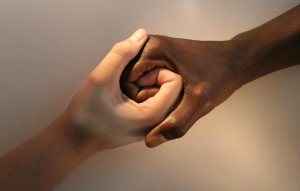Originally published on Adios Barbie and cross-posted here with permission.
Twelve years ago, I was doing social justice work through a community engagement project in a 10th grade class in San Francisco.
The class consisted of kids from the Mission District and Bayview Hunter’s Point. Mission District at the time was a vibrant Latino community and a hot zone for gang activity. Life for my students from this district was rough. Among other things, many had lost loved ones to gang violence. Walking from school alone was a scary practice, as kids were threatened and harassed to join a different gang on a daily basis.
My students from Bayview Hunter’s Point faced similar challenges. This community of regular folks making their way through life like the rest of us was known for gangs, drugs, prostitution and violence. One student, Artese, a warm girl ready to joke at any time described hearing gun shots and stepping over condoms and syringes on her daily walk to and from school.
One day, a group of girls in my class were chatting about their bodies. At that time the myth was that body image issues didn’t affect girls of color, so I was a bit surprised. I listened intently and was deeply saddened by what I heard. Many of the Latina girls were on diets and taking diet pills. Norma, who was on the thinner side of normal said, “Yeah, I still have some pounds to lose”. Two black girls were saving their money for boob reductions, including Artese. I wondered, “How can these bright, beautiful, loving young women face so much in their lives and in their communities and yet be so concerned with their size?”
I knew at that moment that race, class, gender, size, etc. were intricately intertwined and I couldn’t fight for one while ignoring another. It was then that I began incorporating feminism into my work and was inspired to co-founded Adios Barbie with Ophira Edut. Deep in my heart I knew that we must accept our true selves and our intersecting identities in order to see and seek possibilities for ourselves and others. Soon after I found this quote and shared it with my students.
“We cannot think of being acceptable to others until we have first proven acceptable to ourselves.” – Malcolm X
As you can imagine, I’ve always rooted my feminism in a social and racial justice framework. My feminism is one where I seek justice and fight for the freedom of the most oppressed. But lately I’ve been disheartened by a new kind of feminism popping up within feminist circles across the web. This feminism is one of vindictiveness, revenge, and silencing of others with differing opinions. It is steeped in pain and fear, with actions towards other feminists resembling the bullying and peer pressure reminiscent of Mean Girls. This is a feminism of rage targeted towards individuals and not systems.
This is not my feminism.
My feminism is one of inclusion and respect built upon the possibility that loving non-violence can herald radical progress as proven by Martin Luther King Jr. during the civil rights movement. My feminism is one informed by my shehero bell hooks. Who said,
“Visionary feminism is a wise and loving politics. It is rooted in the love of male and female being, refusing to privilege one over the other. The soul of feminist politics is the commitment to ending patriarchal domination of women and men, girls and boys. Love cannot exist in any relationship that is based on domination and coercion….A genuine feminist politics always brings us from bondage to freedom, from lovelessness to loving.” ~bell hooks
hooks has also said that “feminism is for everyone.” And from that I mold my feminism and share with you a new framework based on another framework for advancing racial justice in the world. Hopefully this feminism is one that inspires and moves you towards one of freedom, connection, transformation and real progress.
A Feminist Framework for Trying Times
(Adapted from Applied Research Center’s Strategic Framework for Advancing Racial Justice)
1. Focus on structural sexism and systemic inequality rather than simply personal prejudice (and bias).
2. Focus on impacts rather than intentions…Impacts can be documented, while intentions are debatable and difficult to prove. Rather than dwell on who is sexist, it’s far more useful to focus on the causes and effects of sexism.
3. Address gender inequality explicitly but not necessarily exclusively. Sexism must be illuminated in order to be eliminated. Often other significant factors are involved that must also be made visible, such as race, class, ethnicity and immigrant status.
4. Propose solutions that emphasize equity and inclusion. Sexism is pervasive, but it need not be permanent. Offer proactive solutions that are equitable, inclusive, and viable. It is important to distinguish the principle of equity as fairness.
5. Develop strategies to empower stakeholders and target institutional powerholders. Build inclusive and cohesive alliances that prioritize the full engagement of women and girls as leaders. Make the powerholders with decision-making authority enact changes that target institutional sexism.
6. Make gender justice a high priority in all social justice efforts. A successful progressive movement must recognize gender justice as a central component of social justice. The struggle for gender justice is not a zero sum game. Instead of allowing sexism to drive social division and disparities, we must make gender equity the driving force for uniting and benefiting all people (including men and boys).
Pia Guerrero is the Founder and Co-editor of Adios Barbie and Executive Director of SheHeroes. She’s a media literacy expert with a focus on body image, race, privilege, and representation. She has designed educational and media literacy workshops around the country—directly presenting to hundreds of teachers, youth workers, and young people. The goal of her work around body image is to raise awareness around young people’s over-identification with rigidly defined gender roles and beauty standards as portrayed in the media—proven to be a major cause of low self-esteem and consequently negative health and educational outcomes. Follow at @AdiosBarbie.
Search our 3000+ articles!
Read our articles about:
Our online racial justice training
Used by hundreds of universities, non-profits, and businesses.
Click to learn more





















